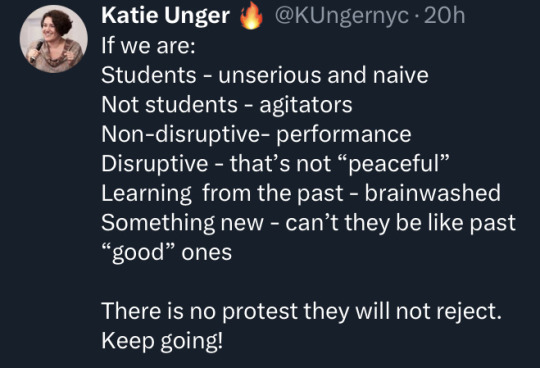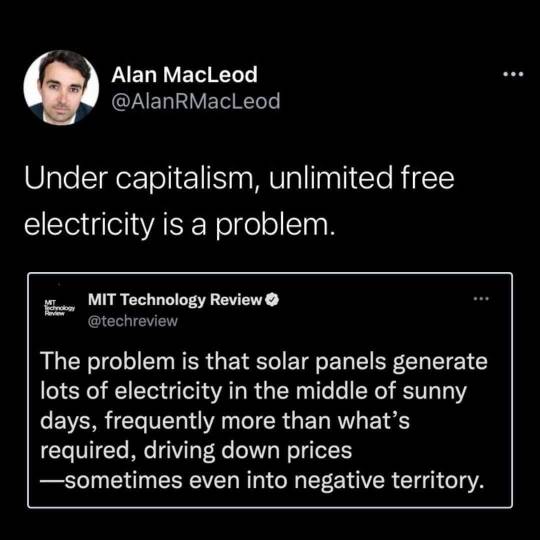#anarchic
Explore tagged Tumblr posts
Text
Ultimate Word Tournament!
Season 2
anarchic (English) /ænˈɑɹ.kɪk/ 1. Relating to, supporting, or likely to cause anarchy. 2. Chaotic, without law or order. 3. Free-spirited; not bound by the rigors or expectations of society.
transgender (English) /tɹænzˈd͡ʒɛn.dɚ/ Having a gender identity which is different from one's assigned sex. An umbrella term that includes nonbinary, genderfluid and agender people as well!
Transgender Propaganda 1 (ft. Haikubot) Transgender Propaganda 2 (cute trans trinkets)
133 notes
·
View notes
Text

2 notes
·
View notes
Text

5 notes
·
View notes
Text

55K notes
·
View notes
Text
new favorite YouTube comment just dropped

#LMAO#wolves#yellowstone#abolish capitalism#guillotine the rich#anticapitalism#leftblr#therian#YouTube#youtube comments#socialism#anarchism#communism#ecology#antiwork#fuck capitalism#eat the rich#babe wake up#all-time hilarity#personal hall of fame
68K notes
·
View notes
Text

#artificial intelligence#global warming#end capitalism#anarchism#communism#direct action#solidarity#class warfare#bash the fash
21K notes
·
View notes
Text
no matter the outcome of this election: organize, build local community, build strength in masses. elections aren't the only time politics happen, it also happens on the streets, in the community and by mutually supporting each other.
the way forward is together. we build power from the ground up. in the US and everywhere else in the world.
a better world is possible and we can start building it now, by ourselves. anarchism starts in the now.
hack the planet
30K notes
·
View notes
Audio
(katharsis)
0 notes
Text
I am so happy I live in a western democracy, if I speak out about my boss I have to find a new job if I speak out about my landlord I have to find a new home if I speak out online I will be muted or banned I can buy 40 brands of breakfast cereal all owned by three different companies if I protest in the street I will be arrested this is the best
24K notes
·
View notes
Text
Ultimate Word Tournament!
Season 2
anarchic (English) /ænˈɑɹ.kɪk/ 1. Relating to, supporting, or likely to cause anarchy. 2. Chaotic, without law or order. 3. Free-spirited; not bound by the rigors or expectations of society.
鱼/魚 (Mandarin) yú /y˧˥/ fish.
55 notes
·
View notes
Text
Something I’ve noticed is that leftist movements tend to turn practical, thought out tactics that were part of a larger plan for liberation, and remove them from their context. Then we often use these tactics as symbolic ways to mark our distaste for empire and harken back to older movements. However, these tactics are often already accounted for by the system, and sometimes are actively encouraged as ways to harm our people and defang our processes.
Here is an example;
In the Civil Rights struggle, getting arrested en mass was seen as an important part of the process of freedom. The civil rights leaders realized that the areas they were in did not have large enough jails to confine them all, and that if they filled the jails up, the police simply could not confine everyone else in the movement. Getting arrested in coordinated ways was a noble and helpful sacrifice that kept your brothers and sisters from getting arrested. Due to less strict sentencing at the time, and the ability of the movement to scare the police into releasing people, getting arrested often wasn’t the utterly disabling and free-life ending process it is today. (That’s not to say getting arrested was easy on people; the police brutality of the time was incredibly intense.)
Those who spent time in jail were given almost a reverent status. That had gone through much suffering to keep others from the same fate. Often, their ability to taking confinement completely off the table for the rest of the activists is precisely what allowed for certain other actions to be successful. Paying for legal defense and moderate bail costs was something of a drain on the movements scant, resources but it could often be worth it due to the role arrests played.
However, the state responded to this, and turned it to their benefit. The next fifty years saw a prison boom. Now, economically deprived small towns were made to bid and beg for prisons to be built in there areas; not only to lock people up, but also because working at the prison was presented as one of the only jobs left in rural America. Additionally, thisdrove the labor minded population to be further in conflict with other movements in some areas.
As the capacity of the government to capture and confine increased, the capacity of the movement to fill up the jails and prevent further arrests did not. Now, the system was hungry for more and more bodies for its endless rooms. It further instilled and mechanized the capacity of prisons to force labor, undercutting labor movements. Sentences became longer, parole became stricter, fines and restitutions increased to exorbitant amounts. Those who went in for petty arrests often never came out.
But, the feeling that getting arrested was a noble and venerable goal did not leave the movement. Some transitioned tactics; instead of filling up the jails to allow others to act without recourse, they sought to get arrested in test cases, as they had seen work occasionally before. But this too became more and more difficult, as the legal system realized it did not have to play by its own rules. Slowly but surely, the legal mythology that because it is written and because it is fair, it will be ruled so, began to overtake the minds of activists; even as they failed time and time again to win this way, they still threw countless of their friends into the mouth of the enemy, and condemned them to life in prison.
Even this had become a shadow of itself by the 2000s and 2010s. Arrest became an aesthetic goal instead of a practical one. The most radical in the movements were culturally encouraged to throw their lives away for petty protests that none would see, and would have no material impact on the operations of the system of dominion. The reality that getting kettled at a non violent protest could land you with the same jail time as a political assassination did not dawn upon these activists until long after hey were already in jail, and already disconnected from the movement. Their friends would gather all their meager savings towards bail funds, oftentimes going into debt, or otherwise extracting money from the rest of the marginalized communities supportive of the activism. Those funds would then go to the government in the form of bail, and then right back towards operating the same policing systems that targeted them. In this way, the main economic output of the leftists movement of the time was to fund the very systems of policing that they sought to destroy; and to get themselves and each other locked in cages in the process. Instead of developing practical systems of change, radicals were taught to emulate key aspects of the tactics of prior generations that had specifically been recuperated into the goals of the state.
Those who saw the futility in this were readily pushed towards the defanged and self acknowledged pointless marches of the nonviolent liberal movement, which never had any goal other than to once again emulate the visual aesthetics and personal emotional fulfillment of past movements.
We see this pattern play out all the time. People insisting on the radical importance of a leftist print newspaper in a time when print journalism is dead. A fetishization of industrial unionism in a town where no factory has been for three generations. Arguments over whether to support long defunct governments and long dead leaders for some tactical benefit which will never arise from reality.
It is long past time for us to realize that the process of achieving human liberation does not come from symbolic actions, nor from following the playbook of past movements. We must learn our history, yes, but not to emulate it; instead we must learn it to understand its failures and its successes, and, most importantly, how our movement ancestors interacted with the material conditions of their time to create multifaceted plans that met the needs of their people and made successful guerrilla war upon dominion.
We need to imagine ways of making change that are suited to the times that we are living in, the problems we face, and the opportunities that we have. This utterly necessitates that we get deeply embedded into the places and communities around us, that we listen with open ears to the problems our people are facing, and that we fold those ever more towards opportunities of liberation and care for one another.
#anarchism#socialism#rose baker#text post#anarchy as religion#anarchy#civil rights#social Justice#leftist#leftism#communism#prison#prison abolition#abolition#abolish prisons#anti capitalism
6K notes
·
View notes
Text

#relevant#communism#socialism#anarchism#capitalism#fascisim#police brutality#free palestine#media narrative#student protests#outside agitators#performative activism#police state#end occupation#land back
26K notes
·
View notes
Text
The other day, me and a few others were talking to a teenage cousin of ours who had just entered the work force full-time. Incidentally, he had also just come back from his week of vacation. He was incredibly upset and near tears, saying that it is terrible how he has to spend every day working and his only "life" gets to happen in his designated 1-2 weeks off per year, and, in his words, "then you die."
A lot of the people listening in started laughing at him and saying that he needs to "grow up and get used to it." How brainwashed do you have to be to say these things, especially to a kid in distress? And especially when the kid is right? He is absolutely, 100% right.
We have so much evidence that this set up is not healthy physically or psychologically. We could absolutely find better ways to ensure things get done without making people feel like overused machines. Everything we do as humans should be about making our lives happier and easier so that we can enjoy this precious little time we have. Everything we do now is instead about making the select few happier while everyone else suffers.
Don't "grow up and get used to it." Keep that youthful feeling of injustice when you realize how unfair it all is. This is not natural. People made society this way and we can unmake it.
52K notes
·
View notes
Text
NEW ESSAY: anarchism starts in the now: hope for a better future
there is still time

cover art: @punkitt-is-here
10K notes
·
View notes
